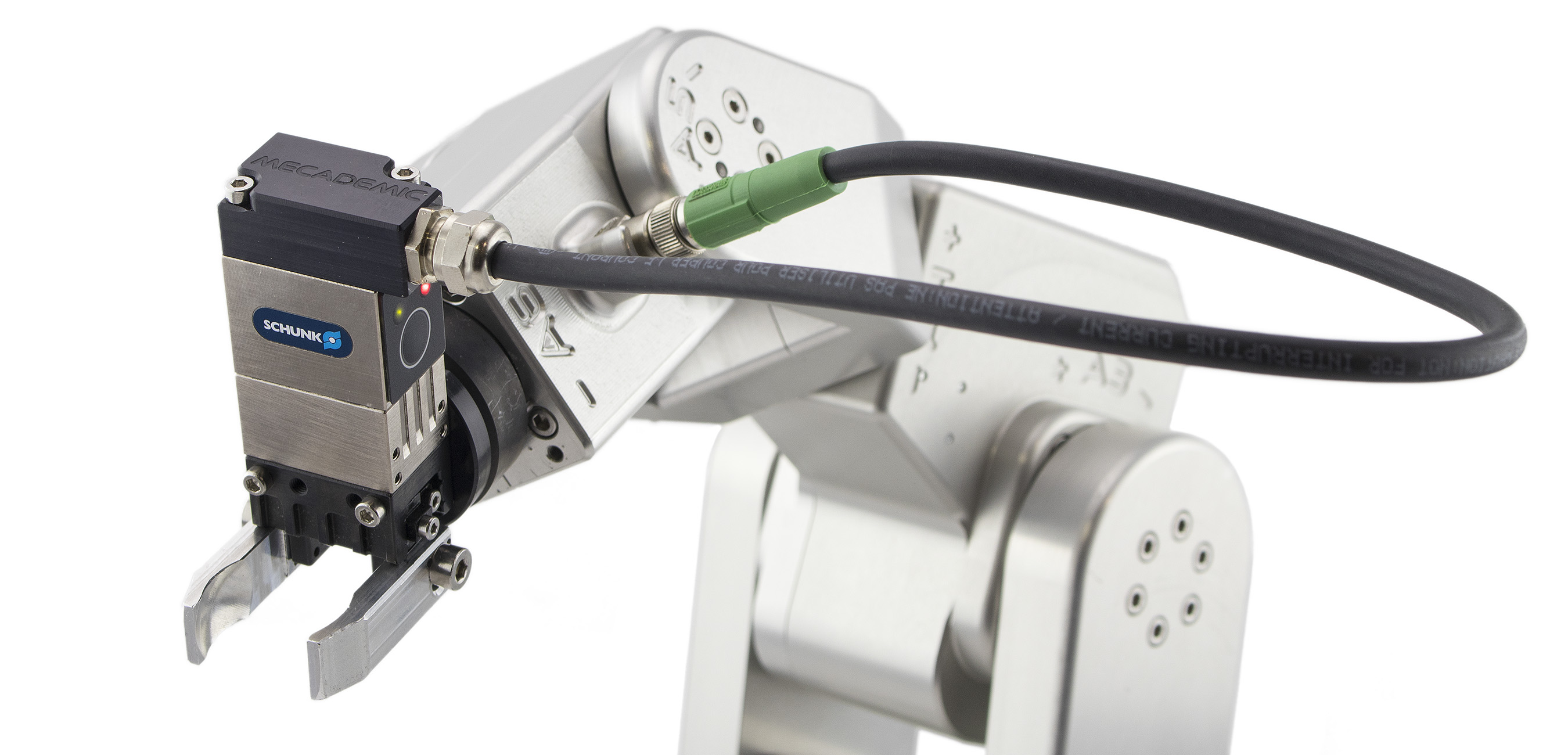
Mecademic Meca500 small industrial robot.
A FANUC industrial robot nonchalantly lifts a BMW SUV high into the air at Automatica 2018 – safely out of harms way, of course. Meanwhile, small industrial robots that fit in a backpack also wow attendees by performing precision tasks that are, let’s say, less exciting.
It’s quite a contrast to see. ABB, Denso, Mecademic and Yaskawa all demonstrated newer small industrial robot arms, showcasing the breadth of innovation taking place in the industry.
Mecademic beat the others to the punch giving us the first glimpse of the 6-axis Meca500 small industrial robot in 2014. The robot launched in mid-2016. The Montreal-based company used Automatica to launch the next-generation Meca500 that has absolute encoders so the robot remembers its location when it’s powered down or has an outage. Co-founder Ilian Bonev says the Meca500 also now has faster joint velocities, unlimited rotation on joint 6, and a safety module with an integrated power supply.
The rest of the small industrial robot remains the same, including the embedded controller in the robot’s base and a set of instructions rather than a proprietary robot programming language to learn. Users permanently connect the robot to a computer or a PLC via Ethernet and use the programming language of their choice.
Meca500 from @Mecademic now has absolute encoders, no mechanical limits on joint 6, faster joint velocities, safety module with integrated power supply. #robots #robotics #automatica2018 pic.twitter.com/OXzjUhhnXt
— The Robot Report (@therobotreport) June 21, 2018
“Ninety-five percent of our clients buy this robot because they don’t have space,” says Bonev, who added that Mecademic is expanding into a bigger office in September 2018. “If they had the space, they’d probably prefer to buy KUKA or FANUC because they’re more familiar with them. Precision is the number two reason people buy it.”
And the precision, Bonev’s specialty, is incredible. The Meca500, which sells for about $15,000, has a repeatability of 0.005 mm and a path accuracy better than 0.1 mm. He credits a lot of this to the fact Mecademic makes many of the Meca500’s parts in-house. You won’t see the Meca500 lift a BMW anytime soon with its 0.5 kg payload and 330 mm reach, but the robot so far is used for inspection and pick and place applications.
“So far we’ve sold more than 200 robots, but this year alone we’re expecting to sell hundreds more,” he says. “The most important thing is that more and more clients are buying more than one robot. They’re not just buying it to try it, we already have a lot of returning customers.”

ABB’s new single-arm YuMi launched at Automatica 2018.
Small industrial robot competition
Bonev says Mecademic decided to focus on smaller robots because, at the time it was founded in 2013, it was a niche market. When the company started, he says, there were robots with minimum 3 kg payloads. It’s still a niche market, but the race is heating up thanks to the aforementioned players. Here’s a quick comparison of how these mini industrial robots compare:
“The fact that other players are in this niche market means we were right,” Bonev says. “There is a need for these robots.”
Bonev says the competition is good because companies will start making tool changers and grippers, for example, specifically for smaller robots. Again, Mecademic custom-makes most of the components for its robots in-house. It doesn’t even tap a readily available library, such as ROS, for the controller. That’s all done from scratch. Mecademic buys the motors and drives from third-party companies, but that’s about it, according to Bonev.
ABB essentially took its popular dual-armed YuMi robot and cut it in half to reduce its footprint. Many features remain the same, including the 0.5 kg payload. ABB says it uses a new “compact” external controller. The Yaskawa MotoMINI has a 0.5 kg payload with a 350 mm reach and 0.02 repeatability. The MotoMINI uses an external controller called the YRC1000micro. Like the Meca500, the 6-axis Cobotta from Denso also has an integrated controller. Denso says the integrated controller is open, and Cobotta’s control API is public to allow developers to create their own applications.
Maybe the best visual at #automatica2018. Certainly shows off the power of @Fanuc industrial #robots pic.twitter.com/iiHYJ5jy19
— The Robot Report (@therobotreport) June 21, 2018
Mecademic shows SCARA prototype
Mecademic also showed a SCARA robot prototype at Automatica. Bonev says the SCARA robot essentially has the same base, controller, and philosophy as the Meca500. However, it has four degrees of freedom instead of six.
He says the SCARA robot is, of course, faster than the Meca500, making it well-suited for pick and place applications. Bonev admits there’s more competition in the SCARA market because there are options already available with integrated controllers. Mecademic plans to start selling the SCARA robot by the end of 2018.





Tell Us What You Think!